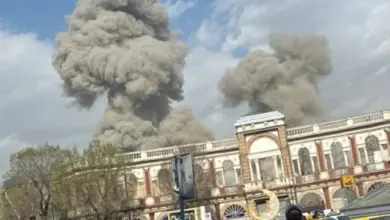On Sunday, Israeli officials failed to show up at several memorial services across Israel to honor its soldiers who fell during the 1973 October War. The reason: a protracted cabinet meeting concerning a controversial vote on social justice reforms that have been demanded by Israeli protesters for months. Popular backlash against Israel’s government was severe.
“The parliamentarians don’t remember the fallen soldiers,” read a headline from Israel Channel 2 news website. The right-wing daily Israel Hayom wrote that in Tel Aviv, “bereaved family members became outraged and threatened to call off the ceremony.” Government officials later issued an apology.
Thirty-eight years after the 1973 October War, memory of the event remains a powerful force, not only in Egypt, but also in Israel. As Egypt began celebrating the 38th anniversary of the 1973 October War, which began with the crossing of the Suez Canal on 6 October, Israel began mourning for the surprise assault that ultimately resulted in "the mother of all traumas," in the words of Gideon Levy, a commentator for Haaretz, Israel's left-wing daily.
By the war's end on 25 October, there were about 2500 Israelis dead and 9000 wounded, more than three times as many as its previous three wars combined (the War of Attrition, the June 1967 War, and the 1956 Suez War). Although Egyptian and Syrian casualties during the October War vastly outnumbered those of Israeli, the comparatively tiny population of Israel meant that its casualties represented a greater proportion of the population than was the case for its Arab counterparts.
On 6 October, 1973, Egyptian and Syrian forces launched a coordinated, surprise attack against Israel in the Sinai Peninsula and the Golan Heights. Warnings of the attack were issued late by Israel’s high command, giving its troops little time to get to the front in an orderly way. Although Israel eventually succeeded in repelling the advancing Arab armies, popular anger in Israel at the leadership’s failure to anticipate the attack led to the resignation of Golda Meir, Israel’s then-prime minister, in 1974.
According to Israeli academic Udi Lival, “If the ultimate Jewish trauma was the holocaust, the ultimate Israeli trauma was the Yom Kippur War,” the name Israelis give to the 1973 October War because the fighting began on the Jewish holiday of Yom Kippur, or Day of Atonement, the holiest day of the Jewish calendar. Lival’s words are quoted in Maariv, a Hebrew language daily, in an article entitled “A Cry from the Grave: More and More Books Deal with the Yom Kippur War” by journalist Shiri Lev-Ari. She notes a rising interest among the Israeli public in learning details of what happend in the conflict.
“Israelis are drawn to this sad chapter of history as if the wound is still open and bleeding,” she writes.
Writing for the Jerusalem Post, Hirsch Goodman, a senior research fellow at the Institute for National Security Studies at Tel Aviv University, suggests the reason. "War had broken out simultaneously on two fronts,” he writes, “Israel had lost intelligence assets and territory on the Golan in a flash and Egyptian forces were streaming over the canal, easily tramping over the skeleton Israeli crews, almost all reservists, who had been sent to the front lines for the holidays so the youngsters could be with their families." Moshe Dayan, Israel's defense minister at the time, said he feared "for the destruction of the Third Temple," meaning the newborn Jewish state.
In Maariv, Dan Halutz, who served as Israel's air force commander and chief of staff during the Second Lebanon War, writes an op-ed entitled “War, Memory, and Lessons” about the air squadron in which he served. “We began with 55 fighter pilots,” he says, “but at the end, we sat in the debriefing room with only 34, many of us physically healthy but mentally harmed.”
Perhaps Israel’s greatest trauma, then, was psychological. Israel’s Channel 2 news runs an interview with Gabi Ashkenazi, Israel’s former chief of staff who stepped down earlier this year. Ashkenazi was drafted into Israel’s armed forces in 1972, and saw action for the first time during the October War while serving in Sinai.
Israel had become accustomed to crushing its enemies. “We grew up with an Egyptian army that ran away,” Ashkenazi recalls, “with their sandals and shoes thrown on the side of the road – because it was easier to escape barefooted – with wrecked vehicles and burnt out tanks along the whole way to the canal. And Israeli tanks racing in the dunes, soldiers standing up erect behind their gun turrets, with their mythological leadership… that was the image we grew up with.”
In obliterating that image, the war therefore created a sort of cognitive dissonance.
"We were really our own prisoners,” writes Halutz, “in believing that we were so strong and that our rivals wouldn't doubt [our strength]. The word 'surprise' was not in our vocabulary, as far as it related to the military initiative of Arab countries."
In an op-ed, Dan Margalit, a journalist with Israel Hayom, recalls the general mood at the end of the war. Despite his insistence that “the IDF ultimately prevailed in what was an unparalleled victory,” he concedes, “the feeling was that we had been dealt a crushing defeat, and our hearts were wrenched. His article is titled "The Lesson from the Yom Kippur War: No to Defense Cuts.”
In Israel’s best-selling daily Yedioth Ahronoth, Israel's current Chief of Staff Benny Gantz is reported as talking about the lessons of the war. The main one, he says, “is that we must always be war-ready.”
Channel 10 news and Channel 2 news, the country’s primary television news networks, show Gantz putting his words into action. He is shown lecturing troops last Thursday, one day before Yom Kippur, on the importance of training and preparation. In what Yedioth Ahronoth calls “a rare and unusual step,” he had called up two divisions the day before as part of an emergency drill. The exercise, in which reservists had 24 hours to report to their bases, was to “test the soldiers' level of response and readiness for war,” according to paper.
The drill’s timing – against the back-drop of the Arab Spring and recent tensions with Egypt – does not go without notice. “The timing is more than a coincidence and is part of the army's preparation for the upcoming days in light of changes in the region," Yedioth Ahronoth quotes the head of the Operations Division's Inspection Department, Colonel Shlomi Fayer, as saying.
In early September, the same newspaper had also reported Major General Eyal Eisenberg, IDF Home Front Command Chief, warning that the “Arab Spring” could turn into a “radical Islamic winter.” He had said that recent revolutions in the Arab world – combined with deteriorating ties with Turkey – increases the likelihood of regional war. Egypt was listed as only one of a litany of threats, that also included Turkey, Iran, and Hamas: "In Egypt, the army is collapsing under the burden of regular security operations, and this is reflected in the loss of control in the Sinai and the turning of the border with Israel into a terror border, with the possibility that Sinai will fall under the control of an Islamic entity.”
In recent months, Israel witnessed protests – unprecedented in scale – for a better standard of living, the cost of which many Israelis said should be reallocated away from defense spending. Earlier this week, such a move was approved by the Israeli cabinet.
Some see this as evidence that Israelis are ill-prepared for war.
"The vigilance we need to defend our country in this hostile neighborhood – a villa in a jungle, as Defense Minister Ehud Barak puts it – has given way to turning a blind eye and to hedonism,” scorns Dan Margalit, an Israeli journalist, in an Israel Hayom op-ed. Margalit says he has always been an opponent of cuts to defense spending due to what he witnessed during the October War.
“Too many people seek the good life. This is a recipe for Israel finding itself, once again, isolated when war breaks out, because of hubris and/or complacency,” he adds.
But others find reason for optimism. Goodman, for example, puts Israel's relationship with Egypt in historical perspective.
"Egypt is in disarray and it was not great seeing our embassy sacked," he writes, "but our diplomats are back in Cairo, albeit hiding in the basement…" That's quite a contrast to the lead-up to the situation in 1973, he suggests, when Israel and Egypt were still officially in a state of war.
And Barry Rubin, also writing for the Jerusalem Post, points to other reasons for optimism. "The Arab states in 1948, 1967 and 1973 were relatively united," he writes, "and with a superpower sponsor to boot. But they couldn’t destroy Israel. So how are they going to do so today, with Israel outpacing its neighbors on every index of social and economic development?" Rubin heads an Israeli think tank called Global Research in International Affairs (GLORIA).
"Egypt faces not some bright new economic dawn," he reassures, "but rather a terrible reckoning."




